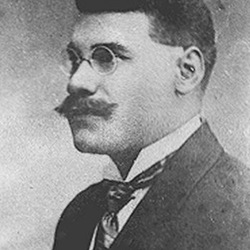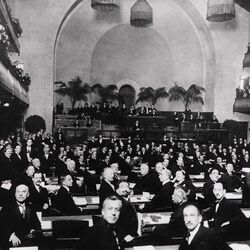Address delivered by Miss Jane Addams at the City Club on Tuesday Evening, February 23rd, 1926, at 6:30 o'clock.
MISS ADDAMS: It may be true that we don't need any more information about the League of Nations, but I would like to tell a little story which the situation suggests to me.
In 1915 when some of us were in Europe urging a meeting for a conference of neutrals, hoping that a body such as that might possibly find some way of shortening the war, the English women were very anxious to have me see Lloyd George, who at that time was Minister of Munitions. The only time he would see me was at breakfast, so I went to breakfast in Downing Street, and the only other person there was Lord Reading, who has since become Viceroy of India. Lord Reading was called to the telephone. It was war time; everything was very irregular, and he stayed at the telephone for some minutes. Almost as soon as he left the room, Lloyd George turned to me, and in that curious way he has -- I suppose nobody in the world equals him in that -- of throwing his mind into the person's mind to whom he is speaking so that he takes color, absolute color from such a person, began to talk passivism to me. And he said that the Sunday before he had spent the entire day with the Minister of Munitions from France discussing in general the type of munitions which they wanted on the field. He said [page 2] every little while one of the generals would say "Don't send us any more shells like that; they make a great noise, but they don't kill; we want something that will kill." Lloyd George said, "You know, I am a bit of a pious Welshman, and when I was young I used to be a lay preacher, and went around talking about love and good-will, and all of a sudden I said to myself, 'David Lloyd George, what are you doing -- you are spending the entire Sabbath day talking about killing men;' and I had a very queer feeling inside me, a very queer feeling inside me, my heart seemed to turn over, turn around." Well, of course that was too much for me, I couldn't quite lose that chance to preach, so I said, "Don't you think, Mr. Lloyd George, when we have those revulsions, those innate revulsions about what we are doing that it is time to look into the matter a little? Perhaps you better look into this spirit of killing men and see what it is, what it is all about." Just at that moment Lord Reading came back, and Lloyd George, throwing back his head -- I hope some of you have seen him do it; he throws back his head almost as if his head were coming off. I once saw him doing it at a church in such a manner that I became alarmed. He threw back his head in a curious way, and he said, "Oh, Lord Reading, here is Miss Addams trying to change the whole course of the British Empire by converting it to [page 3] passivism." I said, "Not at all, we are not discussing passivism, but were discussing your bad conscience, which is quite a different thing." He said, "No, my conscience isn't bad, my conscience is pretty good, it is the soundest conscience in the United Kingdom," and so forth. My meaning was lost and the whole thing was over.
But I think that is what the League of Nations represents. It represents the common revulsion which all mankind always has had and always will have against killing, against killing men.
After the great wars of Alexander the world made an abortive effort to do something to avert war, as you know, and it tried it over and over again. There was a little effort after the Thirty Years' war and after the wars of [Napoleon]. There was a very successful effort to found the Holy Alliance. It was fruitful, it was successful for some years in averting war. Then after the great war, after the World War came this effort of the League of Nations. Now, whether it is fully successful or not -- and of course we are ready to say that it has great difficulties and faults -- still it is the effort of our generation to avert war, and it was born out of the suffering and out of the horrible sense of cruelty and wrongdoing which came at the end of the war. And it seems to me [page 4] that not to be in this big effort, not to be part of it, not to suffer its blunders and mistakes even, is a big mistake on the part of our dear nation.
Then we hear so much criticism about France. I was in Europe during a part of the Peace Conference and heard a great many things being said, not only by Europeans but by traveling Americans, putting the blame for the failure of this thing and that thing on Clemenceau and Mr. Wilson, and this person and that person, but I always felt that Smuts, the man from South Africa, had uttered the wisest words. He said it was the human spirit itself that failed at Paris; that you couldn't put the human spirit through the horrors of war for four years; you couldn't stir men up to hatred and animosity and willingness to kill each other, and then suddenly have it all die down and have them turn and be kindly and generous to each other -- the human spirit couldn't do it; you had to give it time. And I suppose the Locarno Pact proves that, that that spirit that within the year has come out of the League of Nations came after the feeling had had time to die down.
We can't quite tell what the future may hold. If the whole effort, the whole impulse towards good-will and understanding is lacking, you will have war. I have a theory that mankind thirsts for peace and good-will. It is the natural [page 5] realization, it is the natural thing, and the other thing is the unnatural thing, the other thing has to be worked up, and men have to be driven to it and told lies to get them started into it, and all the rest of it. If we just let human nature loose in certain directions we might find astonishing results, and the League of Nations is an effort to institutionalize, or to use Mr. Shields' word, to capitalize, to canonize, as Mr. Wilson used to say, canonize the emotions of mankind, the goodwill of mankind, so that it may function, and I believe it is functioning and is going to come out to a very much larger result, a very much larger life than it has ever attained before.
I am not going to start into a lecture, but there are two or three people here whom I have heard talk about the League of Nations and the high moments which they reached when they were attending the assembly, and I am going to ask them, one or two of them, to speak to you. But before doing so I am going to tell a story which seems to me to be a high moment.
I was in the assembly in 1922 when a man from Haiti, one of our sister republics that we don't always regard with the utmost degree, a man from Haiti, a black man, got up and made a protest because some possessions in Africa, in the middle of Africa belonging to Great Britain had been bombed, I think to collect taxes, and these airplanes had gone over [page 6] the land and dropped bombs into a village, and of course the bombs hit men, women and children, as it happened, and this man from Haiti got up and protested in the name of these colored people against such outrageous happenings. Almost immediately the representatives of the British Empire were on their feet. There were three of them. They were very distinguished men -- Lord Balfour, Lord Robert Cecil and Professor Murray of Oxford. And these men were on their feet, not to defend the action, of course, but to admit it and apologize, as it were; at least it was put in such a way that it amounted to an apology, and they said things like that did happen in a far-flung empire; that no one regretted it as much as the home office, and the man responsible for the bombing had been recalled. Of course it was an outrageous thing to do, to take helpless people who were behind in their taxes, or for any other reason, and bomb them from the air, and that as far as they could promise anything with frail human nature as it was, they would promise to every person there that such a thing would not happen again. Yet here was a man from Haiti with a chance to challenge a big and gigantic thing like the British Empire. And I suppose never before in the history of the world has there been a little spot which has been cleared out, as it were, from nationalistic claims and feelings so that [page 7] there could be an international greensward where people could meet, and where a man, a black man from Haiti, could challenge statesmen who represented the British Empire. And that is the sort of thing which is continually happening at Geneva.
I shall have only a little more to say. It seems to me a great day when we can fill the Auditorium in Chicago to hear a foreign subject discussed. If people are interested in that, it seems time we got into international affairs. And I am sure whatever else Senator Borah is, at least he is perfectly honest in his convictions, and that is the reason he gets so many people to listen to him, because he is honest and straightforward.
I am very grateful to you for having listened to me. The moving picture was very good, and I am sure we all wish to congratulate Mr. Shields on his fine piece of work. (Applause).
Now, Mr. Chairman, the meeting is yours once more.







































Comments